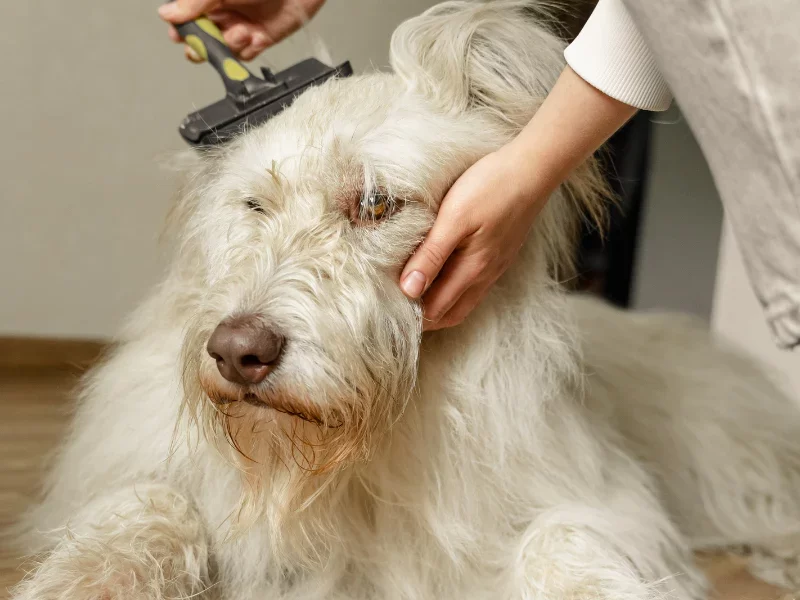Dog Hair Loss Treatment: Effective Solutions to Prevent Shedding and Promote Regrowth
- Understanding Dog Hair Loss Causes
- Common Dog Hair Loss Issues
- Treatment Options for Dog Hair Loss
- Home Remedies for Dog Shedding
- Professional Dog Hair Loss Treatment
- Case Studies of Dogs with Hair Loss
Understanding Dog Hair Loss Causes
Dog hair loss can occur for a variety of reasons, and understanding the underlying cause is essential in determining the best treatment. The most common causes of dog hair loss include:
- Seasonal Shedding: Many dogs experience natural shedding during seasonal changes, especially in spring and fall. This is typically not a cause for concern.
- Allergies: Allergies to food, environmental factors, or parasites can lead to hair loss. Dogs may also scratch excessively due to itchy skin caused by allergic reactions.
- Parasites: Fleas, ticks, and mites are common culprits behind hair loss in dogs. These pests can cause itching, irritation, and hair thinning.
- Hormonal Imbalances: Conditions like hypothyroidism or Cushing’s disease can disrupt hormone levels, leading to hair loss or thinning.
- Skin Infections: Bacterial or fungal infections, such as ringworm, can lead to patches of hair loss in affected areas.
Understanding the cause of your dog's hair loss is the first step toward choosing the right treatment for their specific needs.
Common Dog Hair Loss Issues
Hair loss in dogs can manifest in different forms, and recognizing the type of hair loss can help in identifying the underlying issue. Some of the most common hair loss patterns in dogs include:
- Patchy Hair Loss: This often occurs due to fungal or bacterial infections, allergies, or parasites. The hair typically falls out in small, isolated patches.
- Diffuse Hair Thinning: Hormonal imbalances, nutritional deficiencies, or stress can cause overall thinning of the coat, affecting larger areas of the body.
- Excessive Shedding: If your dog is shedding more than usual, it may be due to seasonal changes, stress, or underlying health issues. While some shedding is normal, excessive hair loss can indicate a problem.
Identifying the type of hair loss your dog is experiencing can provide valuable clues about the best approach to treatment.
Treatment Options for Dog Hair Loss
Once you've identified the cause of your dog's hair loss, it's time to explore treatment options. Depending on the underlying condition, here are some potential solutions:
- Medications: For conditions like hormonal imbalances, your vet may prescribe medication to restore hormone levels and promote hair regrowth.
- Allergy Management: If allergies are the culprit, antihistamines or steroids may be prescribed to reduce inflammation and itching. Additionally, changing your dog’s diet or environment can help eliminate allergens.
- Topical Treatments: Shampoos and ointments designed to treat skin infections or soothe irritated skin can help reduce hair loss. These products often contain ingredients like aloe vera, oatmeal, or hydrocortisone.
- Parasite Control: Regular flea and tick prevention can stop the hair loss caused by these pests. If your dog is already infested, topical treatments or oral medications may be needed to eliminate the parasites.
Consult your veterinarian to determine the most appropriate treatment based on your dog’s condition.
Home Remedies for Dog Shedding
If your dog is experiencing mild hair loss or shedding, there are several at-home remedies you can try to manage the situation:
- Regular Grooming: Brushing your dog’s coat regularly helps remove loose fur and prevents mats, which can contribute to hair loss. It also stimulates the skin and promotes healthy hair growth.
- Omega-3 Fatty Acids: Adding omega-3 fatty acids to your dog’s diet can improve skin health and reduce shedding. Fish oil supplements are a popular choice.
- Avoiding Overbathing: Overbathing can dry out your dog's skin, leading to hair loss. Use a gentle, moisturizing dog shampoo and bathe your dog only when necessary.
- Stress Reduction: Stress is a major factor in dog hair loss. Ensure your dog has a calm, safe environment, and provide regular exercise to reduce stress and promote overall well-being.
These remedies can be effective for managing minor hair loss, but always consult your vet if the problem persists.
Professional Dog Hair Loss Treatment
For more serious cases of hair loss, professional treatment may be necessary. A veterinary dermatologist can help diagnose the underlying cause of your dog's hair loss and provide more advanced treatment options:
- Laser Therapy: Some clinics offer low-level laser therapy, which can promote healing and stimulate hair regrowth in areas affected by hair loss.
- Platelet-Rich Plasma (PRP) Therapy: PRP therapy involves using the dog’s own blood to stimulate hair growth and tissue repair. This is often used for chronic or severe hair loss conditions.
- Surgical Treatment: In some cases, surgery may be required to remove tumors or treat other underlying health issues that are causing hair loss.
Professional treatments can provide faster results, but they may be more costly. Always consult with your vet to determine the best course of action for your dog’s condition.
Case Studies of Dogs with Hair Loss
Here are a few real-life examples of dogs that successfully recovered from hair loss:
Max: Max, a Golden Retriever, was experiencing severe shedding and bald patches due to an allergy to a new food. After switching to a hypoallergenic diet and starting medication to control the allergic reaction, Max’s hair began to regrow, and his coat became thick and healthy again.
Bailey: Bailey, a Cocker Spaniel, was diagnosed with a hormone imbalance causing thinning hair. After a few months of hormone therapy prescribed by his vet, Bailey’s fur regrew fully, and his coat regained its luster.
These success stories show that with the right treatment, most dogs can recover from hair loss and regain a healthy, beautiful coat.
If your dog is suffering from hair loss, visit Hidden Brook Veterinary for expert advice and personalized treatment options. Our experienced veterinarians are ready to help you find the best solution for your dog's hair loss.










